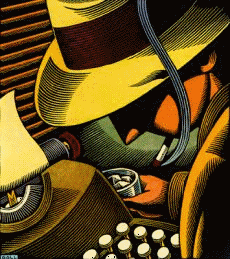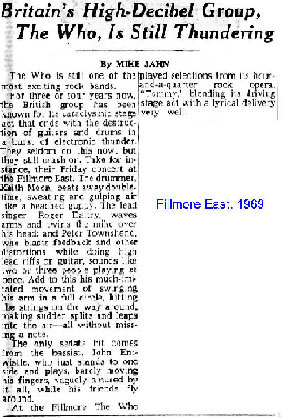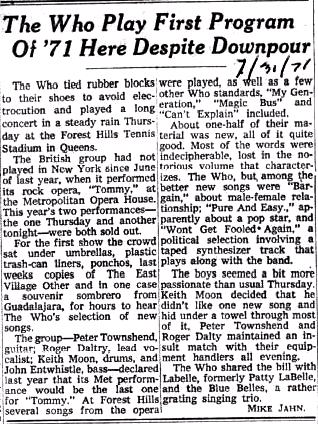Tales of the Ancient Rocker -- The Who
 'Keith Moon decided that he didn't like one new song and hid under a towel
for most of it'
'Keith Moon decided that he didn't like one new song and hid under a towel
for most of it'
I first saw the Who at Winterland, I think it was, in San Francisco in February 1968. I stopped in that city on my way to L.A. to interview the Doors. I did this specifically because the Who had a gig there, and I had heard a lot about them. During the same stopover, I also saw classic sets by Big Brother and the Holding Company (yes, with Janis Joplin), and the Grateful Dead. That also was when I ran into Pete Townsend wandering the streets alone, as lost as I was. History should note that we both were staying at roach motels in the Tenderloin, mine situated right next to the bus terminal -- in those days and possibly still, the hotels next to city bus terminals had a certain cachet, for which I paid $8 a night. Pete and I bought a six pack and went back to his hotel room to talk about rock and roll.
The next time I saw them was in New York, at the Fillmore East, in May 1969.
It was about this time that Pete and I perfected the art of running into
one another -- the next two times at Manny's Music on 48th Street, the
guitar emporium of the rock stars then and now. Later on, he turned up at a friend's
apartment on 110th Street off Broadway, a fugitive from justice.
First, the review I wrote for The Times. It basically informed New Yorkers
who these guys were.
Second, the syndicated column I wrote
the week after, when Pete was running from the law.
The review
May, 1969
Britain's High-Decibel Group,
The Who, Is Still Thundering
By Mike Jahn
The Who is still one of the most exciting rock bands.
For three or four years now, the British group has been known for its cataclysmic stage act that ends with the destruction of guitars and drums in a burst of electronic thunder. They seldom do this now, but they crash on. Take
 for instance, their Friday concert at the Fillmore East. The drummer, Keith Moon, beats away double-time, sweating and gulping air like a beached guppy.
The lead singer, Roger Daltry, waves arms and twirls the mike over his head; and Pete Townsend, who blasts feedback and other distortions while doing high lead riffs on guitar, sounds like two or three people playing at once. Add to this his much-imitated movement of swinging his arm in a full circle, hitting the strings on the way around, making sudden splits and leaps into the air -- all without missing a note.
for instance, their Friday concert at the Fillmore East. The drummer, Keith Moon, beats away double-time, sweating and gulping air like a beached guppy.
The lead singer, Roger Daltry, waves arms and twirls the mike over his head; and Pete Townsend, who blasts feedback and other distortions while doing high lead riffs on guitar, sounds like two or three people playing at once. Add to this his much-imitated movement of swinging his arm in a full circle, hitting the strings on the way around, making sudden splits and leaps into the air -- all without missing a note.
The only sedate bit comes from the bassist, John Entwhistle, who just stands to one side and plays, barely moving his fingers, vaguely amused by it all, while his friends fly around.
At the Fillmore The Who played selections from its hour-and-a-quarter rock opera,
"Tommy," blending its driving stage act with a lyrical delivery very well.
The syndicated column
The Who's Rock Opera, 'Tommy,'
Is Finally Out
By Mike Jahn
Pop Scene Service
June 2, 1969
NEVW YORK (PSS)-The Who, the British rock group, have released their long-awaited
rock opera, "Tommy." The hour-and-fifteen-minute composition covers all sides of
a two-record album just released on the Decca label.
"Tommy" relates the story of a deaf, dumb and blind boy. The plot is roughly this: The boy
learns to make use of his handicap; it gives him a strange inner peace ("He's in a
quiet vibration land"). He becomes an expert pinball player, playing by vibrations.
He then rises to become a Messiah of sorts, with a huge, fanatical following.
Ultimately his following becomes so fanatical he decides to turn them off, and does
so by trying to force them into a too-strict mold. They rebel when he tells them
they must wear earplugs, eyeshades and have their mouths closed, and become
attached to their very own machine, a pinball machine. They reject him, and he
becomes just a deaf, dumb and blind boy (man) again.
A LITTLE "1984"
The opera touches on such ideas as the 1984 concept, where everyone is desensed
and plugged into machines, and the idea of messiahship. From it, the Who took their
current single, "Pinball Wizard."
The opera is constructed faultlessly, with a smooth flowing accoustic guitar sound.
The mood changes often and swiftly. The plot is presented hiply, understated enough
to avoid the usual pitfall of such long productions—overly-obvious language.
The Who have just arrived in this country to start a concert tour at the Fillmore East. Last
weekend they played several selections from the opera, applying their pounding
in-concert hard rock style to "Tommy's" lyrical delicacy fairly well.
They also managed to get involved in a little trouble. At the end of the first set
at the Fillmore, a fire marshall came on stage to warn of a fire in the building next
door and to ask that the theater be cleared. He wasn't in uniform and the Who
threw him off stage twice before finding out who he was.
Police were after them for this alleged anti-heat behavior, though the fire marshall
in question declined to press charges.
-30-
There is more to add here, following the passage of 35 years. Fast-forward to 2004.
It was morning in New York in May of 1969. The phone rang.
It was my friend and Manhattan neighbor Steve Baron, leader of a folk/jazz rock quartet that was opening act for The Who on an American tour. Steve said, "Pete's here. He threw a fire marshal off stage at the Fillmore East and the cops are looking for him. What should I do?"
A fire in the joint next door had let smoke seep into to the famous Lower East Side rockery in the
middle of a concert. A fire marshal went onstage, unannounced and out of uniform, to tell
the audience to leave. Pete thought he was a crazed fan, and tossed him off. I knew dozens of rock stars, had seen lots of crazed fans,
and Steve expected me to give him solid advice.
"Lay low," I said. This was my first and only experience with helping a fugitive evade prosecution.
Ignoring my advice and the hospitality of Steve's Upper West Side apartment, Pete paid
a fine and the whole thing was resolved peacefully.
When the Who wowed 'em at the post-9/11 "Concert for New York," it was before an audience of cops and
firemen. I watched, waiting for Pete to look out into the audience and say, "hey, if Joe Smith is
here tonight, I'd like to apologize for that thing at the Fillmore East."
I reviewed the Who in the Times two more times, one of thich is below.
I will post the third as soon as I manage to shave a few hundred K off the file.

What the Who are up to in 2004
Go to top

for instance, their Friday concert at the Fillmore East. The drummer, Keith Moon, beats away double-time, sweating and gulping air like a beached guppy. The lead singer, Roger Daltry, waves arms and twirls the mike over his head; and Pete Townsend, who blasts feedback and other distortions while doing high lead riffs on guitar, sounds like two or three people playing at once. Add to this his much-imitated movement of swinging his arm in a full circle, hitting the strings on the way around, making sudden splits and leaps into the air -- all without missing a note.
 'Keith Moon decided that he didn't like one new song and hid under a towel
for most of it'
'Keith Moon decided that he didn't like one new song and hid under a towel
for most of it'

